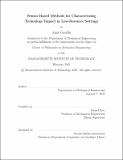Sensor-Based Methods for Characterizing Technology Impact in Low-Resource Settings
Author(s)
Gandhi, Amit
DownloadThesis PDF (61.91Mb)
Advisor
Frey, Daniel
Terms of use
Metadata
Show full item recordAbstract
The development of appropriate technologies aimed at improving the livelihoods of people living in poverty has been a focal area of international aid. These technologies can have a transformative impact on economic growth and individual health when designed and implemented properly. Long-term usage and performance of these products are difficult to measure accurately through self-reporting, and the use of low-cost sensors allows researchers and designers to better assess their overall impact. The first part of the thesis presents a methodology for implementing sensor technologies in lowresource settings. The second part of the thesis presents the design of a novel sensorbased data collection system that was developed for design and impact research. The third part of this thesis presents three case studies where this system is used to evaluate wheelchairs, improved cookstoves, and evaporative coolers. The wheelchair case study in Indonesia compares the performance of different wheelchairs ranging in cost from $100 to $300 and finds little variation between improved wheelchairs in frequency of use and distance traveled. All of the improved wheelchairs show significant benefits when compared to hospital style chairs. The improved cookstove case study demonstrates the effectiveness of using a household air pollution monitor in combination with a stove use monitor to identify cooking events and measure cookstove adoption in a research pilot in India. Particulate matter concentrations in all of the households using improved cookstoves were significantly higher than World Health Organization (WHO) recommended levels. The evaporative cooling case study demonstrates that clay pot coolers are effective at keeping fresh produce more than 5°C cooler than ambient temperatures in the hottest months of the year in Mali. The final part of this thesis examines the ethical challenges that may arise from incorporating sensors for field research and best practices for addressing some of these concerns.
Date issued
2022-02Department
Massachusetts Institute of Technology. Department of Mechanical EngineeringPublisher
Massachusetts Institute of Technology